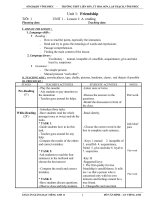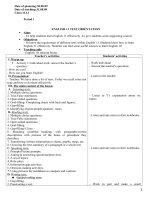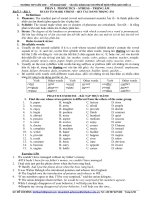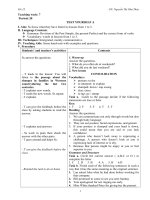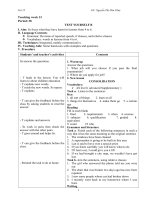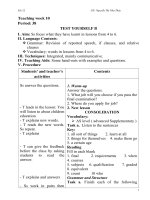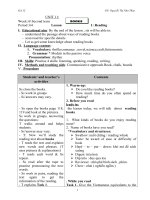unit 1 GIÁO ÁN MÔN TIẾNG ANH LỚP 12
Bạn đang xem bản rút gọn của tài liệu. Xem và tải ngay bản đầy đủ của tài liệu tại đây (173.21 KB, 10 trang )
GA 12
GV Nguyễn Thị Như Thủy
Week:1
Period: 3 – 4
Unit 1: Lesson 1 READING
I. Aim: By the end of the lesson, students will be able to:
- Understand the passage about home life
- Guess the meaning in conext
- Talk about their family
II. Language Contents:
Grammar:
Vocabulary: Words/phrases used to express Life in the family
III. Techniques: Intergrated, mainly communicative.
IV. Teaching Aids: Some hand-outs with the questions.
V. Procedure
Students’ and teacher’s
activities
Contents
- Ss close the books.
1. Warm-up
- Ss work in groups, answer the Questions:
following questions.
1. Who are your family?
- Ss’answers may vary.
2. Do you often help together in your house?
3. How do you feel when everyone shares the
household chores?
2. Before you read
The following picture show you the happiness of a
- Teacher leads in the lesson: family Work in pairs to answer the questions.
Today, we will talk about home Questions:
life
1. What is each member of the family doing?
2. Where is your family?
- Ss open the books page 13, 14 3 Is the family happy?
and look at the picture.
A. READING
- Ss work in groups, answering *Vocabulary and structures:
the questions:
- biologist: a person who studies animals, plants
and people life
- T walks around and helps - caring: care of the other one
students.
- close- knit: friendly
- join hands: together
- Ss’answer may vary.
- leftovers: food that remain after meal
- secure: safe
- T: Now we’ll study the reading - shift: a group of persons who are responsiblefor
something
text about home life
- T reads the text and explains - be willing to: be ready
new words and phrases. (T uses 3. While you read
pictures & explanations)
Task 1. Choose the sentence A,B,or C that is nearest
- T reads each word & Ss repeat. in meaning to the sentence given
1. B
2. C
3. A
4. B
5. A
Task 2. Answer the following questions.
- Ss read after the tape to practise 1. Very busy . they have to work long hours and
1
Me too.
GA 12
GV Nguyễn Thị Như Thủy
pronouncing the new words.
sometimes they have to work at night
- Ss work in pairs, reading the 2. She is always the first one to get up in the
text again to get the information
morning to make sure that her children leave
of the reading.
home for school with breakfast and in suitable
clothes. she always makes dinnerready before her
husband comes home
- T explains Task 1. - Ss work in 3. The daughter helps with the household chores:
groups.
she washes the dishes and takes out the garbage.
- T walks around & helps Ss.
She also looks after the boys and sister. The
- T can give the feedback before
father sometimes cooks or mends things aroud
the class by asking Ss to answer
the house at weekends.
A,Bor C
4. She attemps to win a place at university.
5. Because they are very close- knit and supportive
of one another. They often share their feelings
- T explains Task 2: Now you
and whenever problems come up, they
answer the questions in Task 2
discussthem frankly and find solution quickly
- Ss work in pairs, asking and
answering the questions.
4. After you read
- Ss check the answers together.
Compare the family described in the text with your
- T goes around & helps Ss.
own family
Suggested questions:
- T can give the feedback before 1. How many members are there in your family?
the class by asking Ss to ask and 2. What do your parents do?
answer the questions.
3. Do you share the household with others?
- T suggests Ss’ homework.
5. Homework:
- Learn by heart new words
- Prepare Speaking
* COMMENTS:
----------------------------------------------------------------------------------------------------------------------------------------------------------------------------------------------------------------------------------------------------------------------------------------------------------------------------------------------------------------------
2
GA 12
Week:2
GV Nguyễn Thị Như Thủy
Period: 5
Unit 1:
HOME LIFE
Lesson 2: SPEAKING
I. Aim: By the end of the lesson, student will be able to
- Talk about household chores
- Express their ideas about family life
II. Language Contents:
Grammar:
Vocabulary: Words/phrases used to express Life in the family
III. Techniques: Intergrated, mainly communicative.
IV. Teaching Aids: Some hand-outs with the questions.
V. Procedure
Students’ and teacher’s
Contents
activities
Ss close the books.
1. Warm-up
- Ss work in groups, talking Tell class about their parents in their family
about what the
- T calls some representatives to
tell about FAMILY.
Unit 2: SPEAKING
Talking about your family & you
- T leads in the lesson: Today 2. Before you speak
we’ll practise talking about Task 1 Read the following sentences and tick ( )
FAMILY
the ones that apply to you and your family
2. Members of my family share the household chores
- Ss open the books.
3. My responsibility in the family is to wash the
- T explains Task1: Discuss in dishes
groups about:
3. While you pseak
* What an ideal your family
Task 2. Prepare a list of questions to ask another
* Giving two qualities each student to find out whether his / her family life is like
should have and two qualities yours. You want to know
each should not have.
1. Who works in your family?
- Ss work in groups then
2. Who does the household chores?
exchange together.
3. What is your responsibility in the family?
- T goes around & helps Ss.
4. Does the interest the family members share
closely?
- Ss’answers may vary.
5. Does the person your friend often share his /
- T can give the feedback before
her secrets with?
the class by asking Ss to answer
6. Does the person your friend talk to before
the questions.
making an important decision?
Task 3. Use the questions you have formed to ask
- T asks Ss to practise the your partner about his/her family life ( following task
exchanges in task b fluently.
2)
4. After you speak
Task 4. Go back to your original pairs. Tell each
other the informationyou have collected
- T explains Task 2,3: In pairs,
- I talked to Tam. Both his parents work. But only
3
Me too.
GA 12
you practise asking and
answering about the family life
- T can give suggested models:
GV Nguyễn Thị Như Thủy
his mother does the household chores. His
responsibility waters flowers and irioning clothes
- Ss work in pairs, asking and
answering.
- T goes around & helps Ss.
- T calls one or two pairs of Ss to
practise the conversation before
the class.
- T explains Task 4 Write five
sentences about things you like
doing in the family
- Ss work in pairs.
- T goes around & helps Ss.
- T calls some students to tell
their likes (T can give marks)
- T suggests Ss’homework.
5. homework:
- Prepare listening
* COMMENTS:
--------------------------------------------------------------------------------------------------------------------------------------------------------------------------------------------------------------------------------------------------------------------------------------
4
GA 12
Week:2
GV Nguyễn Thị Như Thủy
Period: 6
UNIT 1:
HOME LIFE
Lesson 3: LISTENING
I. Aim: By the end of the lesson, student will be able to
Listen and pick up specific details
Listen and understand gengeral ideas.
Talk abuot household chores and family life
II. Language Contents:
Grammar: past simple, past progressive, present perfect
Vocabulary: Words related to family activities.
III. Techniques: Intergrated, mainly communicative.
IV. Teaching Aids: Cassette, tape and some hand-outs with the questions.
V. Procedure
Students’ and teacher’s
activities
Contents
1. Warm-up
Listen to a song “ Huyen thoai me “ – Trinh Cong
Son musician
2. Before you listen.
Look at the picture in text book and describe what is
happening in it
New words:
to fly – flight(n)
- T can give the feedback before reserved
the class by asking a student to coach: a kind of car that is used for passengers
read the answers.
3. While you listen
Task 1: Paul and Andrea. Listen to their
conversation and check (Υ) if the statements are true
- T: Today, we’ll listen to a (T) or false (F).
conversation between Paul and
Andrea They are talking about
T F
their family
1. Andrea can’t wait for her
flight.
2. Paul is very excited about
- Ss open the books.
coming home.
- T explains task1. Now you 3.Paul’s home is 280 kilometres
complete the sentences with the from where they are now.
words and phrases in the box. 4. There are more children in
You try to guess the new words.
Andrea’s family than in Paul’s
- Ss work in pairs.
5. When Andrea’s family get
- T goes around & helps Ss.
together,they often go out for
dinner
- T gives the feedback by asking
Ss to read the sentences aloud Key: 1.F 2.F 3.T 4.T 5.T
before class.
Correcting the false sentences.
1. She has booked a flight for tomorrow afternoon
2 Paul hasn’t decided yet.
Task 2 Listen again and note down two things that
Ss work in groups,
5
GA 12
- T explains new words.
- T explains Task 2. You will
liten to the conversation between
Mr. Ba and his grandson, Nam,
about his school days. Listen to
their conversation and check (Υ)
if the statements are true (T) or
false (F).
- Ss read the sentences in Task b
carefully.
- Ss listen to the tape twice or
three times and answer T/F.
- Ss check their answer together
and correct the false sentences.
(T can give marks)
.
- T replays the tape twice.
- Ss work individually, answering
the questions then check the
answers together.
- T gives the feedback by asking
Ss to ask and answer the
questions before class.
- Ss work in pairs, talking about
their family
- T goes around and helps Ss.
- T calls one or two student to
retell his story. (T can give
marks)
GV Nguyễn Thị Như Thủy
are different about Paul’s and Andrea’s families
Paul
His family members aren’t very close
The family often eat the meal, the mother cooks at
home.
Andrea
His is a close- knit family
The family often go out to eat when they get together
* Tapescript
Paul: So, Andrea, you are going home for the
holiday?
Andrea: I sure am. I’ve booked a flight for tomorrow
afternoon and I can’t wait.
Paul: That sounds great.
Andrea: What about you? Going home too?
Paul: I haven’t decided yet? Oh, you are never going
to get a flight out of here. All the seats have been
reserved by now. I’m sure. It’s the holiday season,
after all.
Paul: Well, it’s not very important to me. My family
lives about 180 kilometres from here. I usually take
the train or the coach
Andrea; You don’t sound excited about it
Paul; Well, we are not really a very close- knit
family. I have three brothers and they’re spread out
all over the place. We rarely get together as a family
any more.
Andrea: Well, I try to get home as soon as possible.
We are a big family – there are six of us children –
so it’s always a lot of fun
Paul: six kids?
Andrea Yes we’re all ready close. My brothers are
married, so it makes for a very crowded homeover
the holiday. And there are too many people to cook
for, so we end up going out to dinner a lot. That’s
also fun.
Paul: Well at my home, my mother loves to cook, so
when we get homeshe often cooks big meals. We
have leftovers for days
4. After you listen
Discuss the importance of family in a person’s life
5. Homework
- Write what you remember about Paul (about 50
words).
* COMMENTS:
-----------------------------------------------------------------------------------------------------------------------------------------------------------------------------------------------------------------------
6
GA 12
Week:2
GV Nguyễn Thị Như Thủy
Period: 7
UNIT 1:
HOME LIFE
Lesson 4: WRITING
I.Aim: By the end of the lesson, students will be able to:
- Write a letter to tell about their family rules
II. Language Contents:
Grammar: Revision of the present simple, present perfect
Vocabulary: Words/phrases related to the family.
III. Techniques: Intergrated, mainly communicative.
IV. Teaching aids: Some hand-outs with the questions.
V. Procedure
Students’ and teacher’s
activities
Contents
Ss close the books.
1. Warm-up
- Ss work in groups, answering Answer the questions.
the questions.
Questions:
1. Do you like doing household when you have
- T calls one or two Ss to answer holidays/
the questions.
2. List some things that you have done.
D. WRITING
- T leads in the lesson: Today
Writing about family rules
we’ll practise writing a
2. Before you write
narrative
Task 1. What rules do you have in your family?
Discuss these topics and add others. Use the
- Ss open the books.
following verbs and expressions:
- T explains Task 1. Read the let, allow, be allowed to, have to, permit, etc.
sentences given and write.
- doing household chores
- Ss work in pairs.
- coming home late
- T goes around and helps Ss.
- preparing meals
- watching TV
- taking on the phone
- using the family motorbike
- going out with friends
- ----------------------------------------------------------------------------------------------------------------------I’m allowed to go out with friends on holidays
and visit my grandparents
- In my family, everybody has to do their share of the
household chores
- I’m not allowed to used the family motorbike
T: To you. What tense do people because I’m not enough ages to use
often use to write? (Present 3. While you write
simple tense)
Task 2. Use the ideas you have discussed above to
- T explains: the rules are the write a letter to a pen pal about your family rules.
obligation. It is usually written in Begin as follows
the present tense and used the New words:
7
Me too.
GA 12
GV Nguyễn Thị Như Thủy
Be allowed to: duoc phep
let/ allow/ permit: cho phep
- T explains new words.
Note: You can use time relators: first, next, then,
after that, finally ...
Task 2 Write a story about your family
- Who allow? (e.g. your parents, your sisters, ...)
- What time are you allowed to come home?
- T explains Task 2: Write about - Where / when are you allowed to go out with your
your family rules as suggested in friends? (i
Task 2.
- Why are you not allowed to use the family
- Ss work individually then check motorbike?
their stories together.
*Every family has its own rules. Mine has a few.
- T goes around and helps Ss.
First,
everybody has to share household, I’m not allowed
to come home late and watch TVuntil I have finished
my homework
I permit talking on the phone and going out with
friends on holidays
4. After you write
Writing correction
5. Homework
- Rewrite the story and study it by heart
form of the verb
* COMMENTS:
---------------------------------------------------------------------------------------------------------------------------------------------------------------------------------------------------------------------------------------------------------------------------------------------------------------------------------------------------
8
GA 12
Week:3
GV Nguyễn Thị Như Thủy
Period: 8
UNIT 1:
HOME LIFE
Lesson 5: LANGUAGE FOCUS
I.Aim: - By the end of the lesson, students will be able to
- Recognize the differences in pronunciatinon of the – s ending sound.
- Resive the use of some tense. (past simple and present perfect)
II. Language Contents:
Grammar: past simple, past progressiveand present perfect.
Vocabulary: Compound nouns
Pronuncaition of the ending “s”
III. Techniques: Intergrated, mainly communicative.will be able to:
IV. Teaching Aids: Some hand-outs with examples and questions.
V. Procedure
Students’ and teacher’s
Contents
activities
- T gives some words then ss I. PRONUNCIATION: The pronunciationof the
pronounce
ending “s/ es” ( plural nouns and the third singular
verb in the present simple tense)
- / s / after sounds: / t, p, k, f, and /
- / iz / when words end in : s, sh, ch, x, z, dz
* Activity 1.
- / z / the left sounds
- Ss still close the books.
Listen and repeat:
- Ss work in groups and find the
/s/
/z/
words are pronounced.
bats
bags
* Activity 2.
kits
kids
- T asks Ss to open the books.
speaks
speeds
- T explains the pronunciation.
dates
days
- Ss work in pairs, pronunciation
photographs
halves
and underlining the sounds
* Practice reading these sentences:
1. I saw some bats flying from the bags
* Exercise 1. Presentation
2. He often speaks at the different speeds
- Ss work in pairs, asking and 3. She tore the photographs into halves
answering the questions.
4. I always have days on rainy days
- T goes arround to help Ss.
5. The kids are playing with their toy kits
Questions
II. GRAMMAR: tense revision
1. Have you seen my bag 1. Past simple
anywhere?
Affirmative
S + V(d/ ed) + O
. 2. Hello Peter, are you back
Negative
S + DID NOT + V ( infinitive )
from the match? Have you
Interrogative DID + S + V (infinitive)
enjoyed it?
………….?
3. This is the photo of my great
@ The irregular verbs must learn by heart
grandfather. He was married six
Ex: she went to school 2 hours ago
times
we decided to buy this car
4. Did you give Helen my
@ Using the activity completed in the past
message when you saw her?
2. Past progressive
5. Sorry, could you say that
Affirmative
S + WAS / WERE + V (ing )
again? I didn’t listen to you
9
Me too.
GA 12
6. Have you two met before?
Laura, this is Peter
- Ss give form of these tenses
* Exercise 2.
Practice
- T explains Exercise 1. Put the
verbs in brackets into the correct
form.
- Ss work in groups.
- T goes around and helps Ss.
- T asks Ss to read the complete
sentences to give the feedback.
- T explains Exercise 2. Decide
which answer ( A,B or C ) best
fits each space
- Ss do exercise 2 in groups.
- T goes around and helps Ss.
- Ss go to the board to write the
answers.
* Production
- Ss make sentences by using
the following words and phrases:
- T suggests Ss’homework.
GV Nguyễn Thị Như Thủy
Negative
S + WAS / WERE NOT + V
(ing )
Interrogative WAS / WERE + S + V ( ing )
……?
@ Using the activity is happening at a point of time
in the past
Ex: At 7 o’clock last night, we were watching news
on TV
3. Present perfect:
Affirmative
S + HAVE / HAS + V (pp )
Negative
S + HAVE / HAS NOT + V (pp )
Interrogative HAVE / HAS + S + V ( pp )
…..?
@ Using an action that happened in the past without
a definte time ( used with already, before )
@ An action that has recently occurred but the result
is still in the present ( used with just, recently, lately ,
in the last ( few days), in the past (three years )
@ An action that happened in the past and continues
up to the present or future ( used with since, for, up
to now, up to the present, so far, yet, never )
@ Used I expression
- It ( this / that )is the first time, the second time, the
third time
- The superlative form
Ex: This is the first time I have drunk champagne
That is the best film I’ve seen
1. haven’t written
2. have seen
3. had
4. haven’t done
5. have stopped
6. am waiting
7. have changed
8. live
9. have decided
10. has become
11. told
12. moved
13. come
14. am staying
15. will have gone
@ Exercises
Rewrite the sentences without changing their
meaning
1. We began learning English in grade six
=> We have …………………………….
2. She saw an accident this morning
=> It is the first time ………………………
5. Homework
Do exercise in workbook
- Prepare Unit 2
* COMMENTS:
………………………………………………………………………………………………….
………………………………………………………………………………………………….
10
